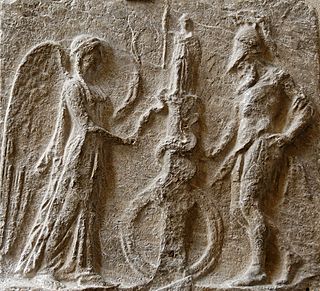 W
WLucius Livius Andronicus was a Greco-Roman dramatist and epic poet of the Old Latin period. He began as an educator in the service of a noble family at Rome by translating Greek works into Latin, including Homer's Odyssey. They were meant at first as educational devices in the school he founded. He wrote works for the stage—both tragedies and comedies—which are regarded as the first dramatic works written in the Latin language of ancient Rome. His comedies were based on Greek New Comedy and featured characters in Greek costume. Thus, the Romans referred to this new genre by the term comoedia palliata. The Roman biographer Suetonius later coined the term "half-Greek" of Livius and Ennius. The genre was imitated by the next dramatists to follow in Andronicus' footsteps and on that account he is regarded as the father of Roman drama and of Latin literature in general; that is, he was the first man of letters to write in Latin. Varro, Cicero, and Horace, all men of letters during the subsequent Classical Latin period, considered Livius Andronicus to have been the originator of Latin literature. He is the earliest Roman poet whose name is known.
 W
WThe Asiatic style or Asianism refers to an Ancient Greek rhetorical tendency that arose in the third century BC, which, although of minimal relevance at the time, briefly became an important point of reference in later debates about Roman oratory.
 W
WThe Athenaeum was a school (ludus) founded by the Emperor Hadrian in the Roman Empire, for the promotion of literary and scientific studies. The name Athenaeum came from the city of Athens, which was still regarded as the seat of intellectual refinement. The Athenaeum was situated near the Capitoline Hill: its site was discovered in 2009 during excavation for the construction of the Rome Metro C Line, in the middle of what is now Piazza Venezia.
 W
WMarcus Porcius Cato, also known as Cato the Censor, the Elder and the Wise, was a Roman soldier, senator, and historian known for his conservatism and opposition to Hellenization. He was the first to write history in Latin with his Origines, a now lost work on the History of Rome. His work De agri cultura, a rambling work on agriculture, farming, rituals, and recipes, is the oldest extant prose written in the Latin language. His epithet "Elder" distinguishes him from his equally famous great-grandson Cato the Younger, who opposed Julius Caesar.
 W
WIn Roman mythology, Evander was a culture hero from Arcadia, Greece, who was said to have brought the Greek pantheon, laws, and alphabet to Italy, where he founded the city of Pallantium on the future site of Rome, sixty years before the Trojan War. He instituted the festival of the Lupercalia. Evander was deified after his death and an altar was constructed to him on the Aventine Hill.
 W
WIn Greek and Roman mythology, the Palladium or Palladion was a cult image of great antiquity on which the safety of Troy and later Rome was said to depend, the wooden statue (xoanon) of Pallas Athena that Odysseus and Diomedes stole from the citadel of Troy and which was later taken to the future site of Rome by Aeneas. The Roman story is related in Virgil's Aeneid and other works. Rome possessed an object regarded as the actual Palladium for several centuries; it was in the care of the Vestal Virgins for nearly all this time.
 W
WThe Panhellenion or Panhellenium was a league of Greek city-states established in the year 131–132 AD by the Roman Emperor Hadrian while he was touring the Roman provinces of Greece.
 W
WIn ancient Roman religion, Roma was a female deity who personified the city of Rome and more broadly, the Roman state. She embodied and idealised certain of Rome's ideas about itself, its advancement and its eventual domination of its neighbours. Roman political, moral and religious ideas were portrayed through Roma in different forms: coins, sculptures and architectural designs, even in official games and festivals but seldom in a commonplace or domestic context, as Roma was a construction of Roman state patronage. Though her depictions have been influenced by other goddesses at the time, such as Rome's Minerva, her Greek equivalent Athena and the various manifestations of Greek Tyches, Roma stands out as a symbol of "natural" dominance, with her promise of protection to those who obeyed or cooperated with her, and her "manly virtue" (virtus) as fierce mother of a warrior race.